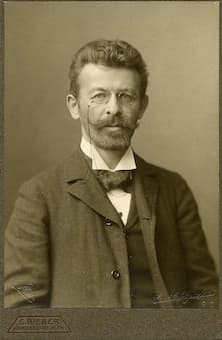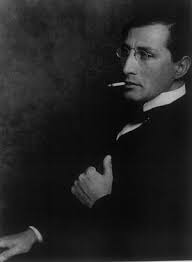
Schiele: Arnold Schoenberg (1917)
In his breakthrough instrumental piece, written in 1899 and given its premiere in 1902, Arnold Schoenberg (1874-1951) set aside all the vocal music he’d been writing to produce a work of true beauty. Verklärte Nacht (Transfigured Night) was based on a short poem by Richard Dehmel.
While Schoenberg was setting his instrumental work in Vienna, another composer in Berlin, Oskar Fried (1871-1941) was setting the same poem by Dehmel as a work for 2 voices and orchestra. This was Fried’s first orchestral composition.

Richard Dehmel
Dehmel’s poem tells of a couple that is walking through a cold winter night. She tells him that she is pregnant by a stranger she met before she met him. She feels awkward, knowing that this confession could sever her connection with the man she now loves. He reassures her that their love will change the child – it will no longer be the child of a stranger but his own child. Their love makes the child theirs.
The poem is set in 5 stanzas, 1 stanza of narration, her speech of confession, another stanza of narration, his speech, a summary narrative stanza. Each composer honored Dehmel’s stanza structure in his setting.
In Schoenberg’s setting, the opening tempo is dark and unsettled. You can hear the hesitation of the partners, but with a build-up to something emotional.
Arnold Schoenberg: Verklärte Nacht (Transfigured Night), Op. 4 – Grave (BBC Symphony Orchestra; Edward Gardner, cond.)
Arnold Schoenberg: Verklärte Nacht (Transfigured Night), Op. 4 – Moderato (BBC Symphony Orchestra; Edward Gardner, cond.)
The woman’s anguished outburst begins with a solo violin passage.
Arnold Schoenberg: Verklärte Nacht (Transfigured Night), Op. 4 – Tempo I (BBC Symphony Orchestra; Edward Gardner, cond.)
Arnold Schoenberg: Verklärte Nacht (Transfigured Night), Op. 4 – Poco allegro (BBC Symphony Orchestra; Edward Gardner, cond.)
The narrative section remains emotional and stormy and ends tentative as she awaits his response.
Arnold Schoenberg: Verklärte Nacht (Transfigured Night), Op. 4 – Pesante (BBC Symphony Orchestra; Edward Gardner, cond.)
His reply shows an amazing change of mood. All is tranquil, all is calm. There is no problem. Put aside the emotion of the past and look only to the future. After the turmoil of the first part of the work, this section shows the redemption of the two people as a couple.
Arnold Schoenberg: Verklärte Nacht (Transfigured Night), Op. 4 – Adagio (BBC Symphony Orchestra; Edward Gardner, cond.)
Arnold Schoenberg: Verklärte Nacht (Transfigured Night), Op. 4 – Poco adagio (BBC Symphony Orchestra; Edward Gardner, cond.)
The final section depicts the couple moving again through the moonlit wood, now in a mood that is a great distance away from the turmoil of the opening of the work.
Arnold Schoenberg: Verklärte Nacht (Transfigured Night), Op. 4 – Adagio (molto tranquillo) (BBC Symphony Orchestra; Edward Gardner, cond.)

Oskar Fried
Writing about the work 50 years later, Schoenberg spoke of it being influenced by both Wagner (in his model-and-sequence structure) and by Brahms’ technique of developing variation but ended up creating a work that is far different than anything by those two composers.
Originally written for string sextet, Schoenberg arranged it for orchestral in 1917. The work was controversial at its premiere not only for its modern harmonies but also for its use of Richard Dehmel’s poetry. The poem appeared in his 1896 collection Weib und Welt (Women and World). The book was censored by the authorities, with some poems over-stamped in black ink. Verklärte Nacht as a poem was considered immoral for its failure to criticize the woman’s premarital sex, and Schoenberg’s setting of the poem seems to carry implicit acceptance of this in its lush setting.
Dehmel approved of the musical setting, writing to Schoenberg to tell him: ‘I had intended to follow the motives of my text in your composition, but soon forgot to do so, I was so enthralled by the music.’
In writing his setting as a vocal work, Oskar Fried took a different path.
We can see Fried’s composition as a kind of post-Wagnerian miniature opera scene. The two voices intertwine as they walk through the winter forest. The tonalities are dark and minor. You can hear the unhappiness and tentativeness not only in the vocal setting but also in the emotions those sounds reveal. Her confession (02: 00), ‘I am bearing a child, and not by you…’ (Ich trag ein Kind, und nicht von Dir…) is exposed and jagged. The orchestra is equally raw. Yet, when he makes his declaration (04:50), ‘The child that you have conceived should not be a burden on your soul…’ (Das Kind, das Du empfangen hast, sei Deiner Seele keine Last….) the music changes to a glorious major. He explains his position and in the final stanza, they walk off together through what is now a ‘brightly shining night.’
Oskar Fried: Verklärte Nacht (Transfigured Night), Op. 9 (Christine Rice, mezzo-soprano; Stuart Skelton, tenor; BBC Symphony Orchestra; Edward Gardner, cond.)
Fried’s is a shorter and in many ways, simpler setting. By setting the text directly, he had to place the orchestra to the background and so lost the many opportunities Schoenberg had for creating soundscapes that could carry the listener into the scene itself.
Zwei Menschen gehn durch kahlen, kalten Hain; | Two people are walking through a bare, cold wood; |
der Mond läuft mit, sie schaun hinein. | the moon keeps pace with them and draws their gaze. |
Der Mond läuft über hohe Eichen; | The moon moves along above tall oak trees, |
kein Wölkchen trübt das Himmelslicht, | there is no wisp of cloud to obscure the radiance |
in das die schwarzen Zacken reichen. | to which the black, jagged tips reach up. |
Die Stimme eines Weibes spricht: | A woman’s voice speaks: |
|
|
"Ich trag ein Kind, und nit von Dir, | "I am carrying a child, and not by you. |
ich geh in Sünde neben Dir. | I am walking here with you in a state of sin. |
Ich hab mich schwer an mir vergangen. | I have offended grievously against myself. |
Ich glaubte nicht mehr an ein Glück | I despaired of happiness, |
und hatte doch ein schwer Verlangen | and yet I still felt a grievous longing |
nach Lebensinhalt, nach Mutterglück | for life’s fullness, for a mother’s joys |
und Pflicht; da hab ich mich erfrecht, | and duties; and so I sinned, |
da ließ ich schaudernd mein Geschlecht | and so I yielded, shuddering, my sex |
von einem fremden Mann umfangen, | to the embrace of a stranger, |
und hab mich noch dafür gesegnet. | and even thought myself blessed. |
Nun hat das Leben sich gerächt: | Now life has taken its revenge, |
nun bin ich Dir, o Dir, begegnet." | and I have met you, met you." |
|
|
Sie geht mit ungelenkem Schritt. | She walks on, stumbling. |
Sie schaut empor; der Mond läuft mit. | She looks up; the moon keeps pace. |
Ihr dunkler Blick ertrinkt in Licht. | Her dark gaze drowns in light. |
Die Stimme eines Mannes spricht: | A man’s voice speaks: |
|
|
"Das Kind, das Du empfangen hast, | "Do not let the child you have conceived |
sei Deiner Seele keine Last, | be a burden on your soul. |
o sieh, wie klar das Weltall schimmert! | Look, how brightly the universe shines! |
Es ist ein Glanz um alles her; | Splendour falls on everything around, |
Du treibst mit mir auf kaltem Meer, | you are voyaging with me on a cold sea, |
doch eine eigne Wärme flimmert | but there is the glow of an inner warmth |
von Dir in mich, von mir in Dich. | from you in me, from me in you. |
Die wird das fremde Kind verklären, | That warmth will transfigure the stranger’s child, |
Du wirst es mir, von mir gebären; | and you bear it me, begot by me. |
Du hast den Glanz in mich gebracht, | You have transfused me with splendour, |
Du hast mich selbst zum Kind gemacht." | you have made a child of me." |
|
|
Er faßt sie um die starken Hüften. | He puts an arm about her strong hips. |
Ihr Atem küßt sich in den Lüften. | Their breath embraces in the air. |
Zwei Menschen gehn durch hohe, helle Nacht. | Two people walk on through the high, bright night. |
|
|
Richard Dehmel | (English translation by Mary Whittall) |
For more of the best in classical music, sign up to our E-Newsletter


